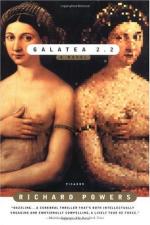
|
| Name: _________________________ | Period: ___________________ |
This test consists of 15 multiple choice questions and 5 short answer questions.
Multiple Choice Questions
1. What does Lentz argue about Helen's mindset?
(a) Her attempts at meaning are more meaningful than the results.
(b) All her meanings are Richard's meanings.
(c) Her meanings are random combinations of notions.
(d) She has begun to create meaning independently.
2. What was C.'s experience of certification?
(a) A disaster.
(b) A mixed blessing.
(c) A life-changing event.
(d) A waste of time.
3. How does Richard crash implementation E?
(a) By asking it two questions at once.
(b) By asking what it wants to talk about.
(c) By asking contradictory questions.
(d) None of the answers is correct.
4. What kind of trauma did Audrey suffer?
(a) Paralysis.
(b) Fits of insanity.
(c) Memory loss.
(d) Depression.
5. What does Richard realize Helen is able to distinguish?
(a) References to current events.
(b) Other people in the room.
(c) Allusions.
(d) Echoes and associations.
6. What does Richard tell Philip Lentz about Helen in section X?
(a) She is unhappy.
(b) She is conscious.
(c) She is at war with herself.
(d) She is alive.
7. What does Richard feel about C.'s coming home in tears?
(a) The tears are necessary in this kind of experience.
(b) The phase will pass.
(c) She should toughen up.
(d) It is his fault.
8. What does the crash of implementation E lead Philip Lentz to develop?
(a) A secondary input processing device for the implementation.
(b) Eyes for the implementations.
(c) Implementation F.
(d) A theory of dissonance.
9. What does Diana call Richard's book?
(a) Uptight.
(b) Brilliant.
(c) Misanthropic.
(d) Generous.
10. What does implementation F develop the ability to do?
(a) Meditate.
(b) Philosophize.
(c) Sing.
(d) Test hypotheses.
11. In what did C. try to get a certificate?
(a) Translation.
(b) Massage.
(c) Teaching.
(d) Editing.
12. What was Richard like when he went to the Netherlands with C.?
(a) Reticent.
(b) Awkward.
(c) Confident.
(d) Sly.
13. What does Richard say Lentz has left behind him?
(a) Inspiration.
(b) Math.
(c) Solid research.
(d) Humanness.
14. Whom does Richard invite out for coffee?
(a) C.
(b) Harold Plover.
(c) A.
(d) Harold Plover's daughter Mina.
15. What do Richard and C. do to relieve the tension in their relationship?
(a) Speak with each other only as needed.
(b) Travel.
(c) Make love.
(d) Drink.
Short Answer Questions
1. What does Richard begin to understand about C. when they live in the Netherlands together?
2. What does Richard give Philip Lentz as evidence for this assertion?
3. What does Lentz create for implementation F?
4. What does Richard's work do for C.?
5. What is the downside of Richard's work in C.'s experience?
|
This section contains 522 words (approx. 2 pages at 300 words per page) |

|




